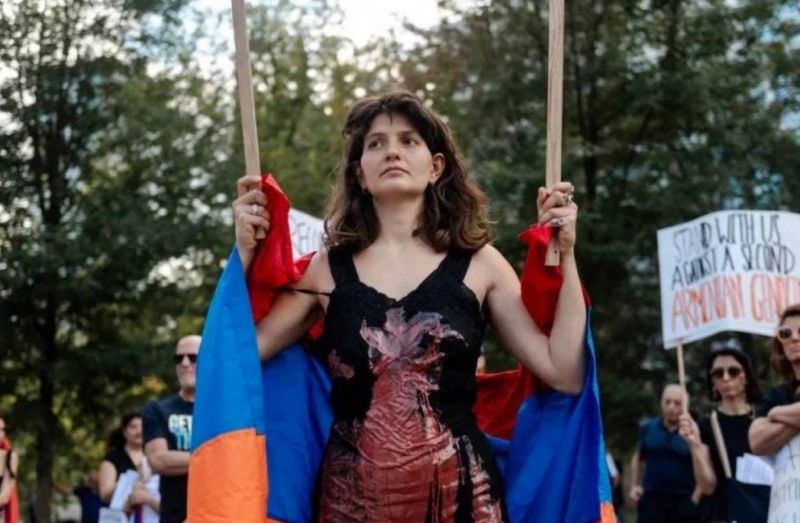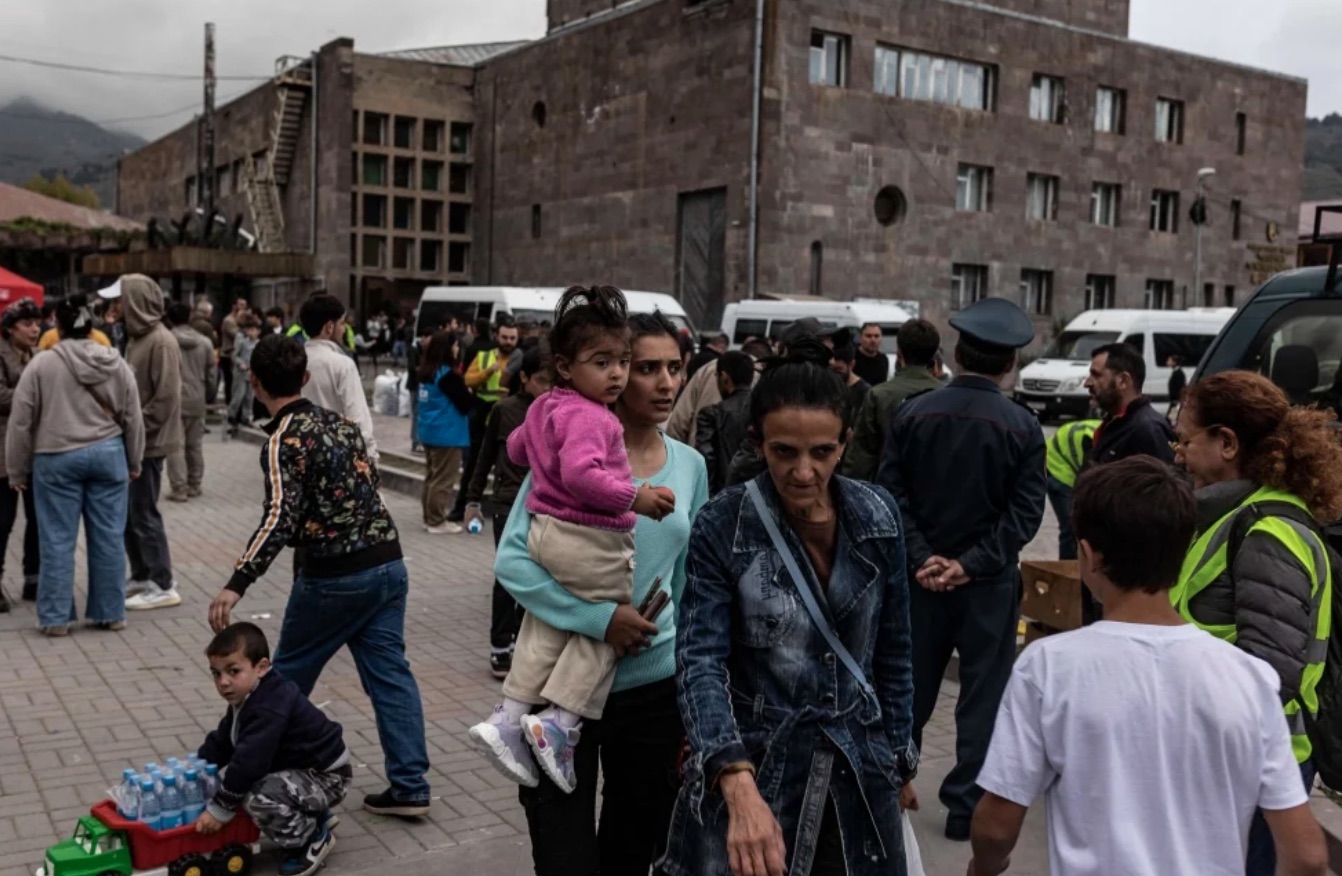
A protester at a demonstration against Azerbaijan's offensive in Nagorno-Karabakh at Place du Canada, Montreal, Quebec, Canada. (Credit: Andrej Ivanov/AFP)
When the war unexpectedly erupted in Nagorno-Karabakh on Sept. 19, Aline Kamakian, owner of Mayrig, a renowned Armenian restaurant in Beirut, immediately took action. Cutting short the culinary conference she was attending in Dubai to showcase Armenian cuisine, she boarded the next plane out. Barely 48 hours after the war broke out, Kamakian landed in Goris, the arrival point for refugees fleeing the predominantly Armenian enclave.
On the spot and in record time, the Lebanese-Armenian restaurant owner set up a food distribution initiative to provide “hot dishes with proteins and meat, a banana or an apple” to those who had been forced to leave everything behind. Through Kamakian’s initiative, some 6,000 meals are being distributed every day in Goris, Vayk and Yerevan, with the help of local restaurants and volunteers.
Armenians, both within the country and from the diaspora, have mobilized to help the displaced. They have come face to face with a fully blown humanitarian crisis. “Everything is full of people, people are sleeping everywhere, in basketball courts, schools, hotel lobbies, you step on people,” said Kamakian. “A mother arrived with the bodies of her two sons in her car, because she couldn’t bury them on the spot,” she said. Speaking to L’Orient Le-Jour, Kamakian broke down twice.
But she stayed anyway, working 20 hours a day on site. On the first night, Kamakian slept in her car because there was no room in the surrounding lodgings. Forced to abandon their land, many of the displaced arrive to Goris with a deep anger and refuse her food “out of pride.” “The diaspora has an Armenian heart,” she said.
A common nightmare
Lerna Bagdjian, 27, had a similar experience. She is a Swiss national based in Geneva where she works as an architect. Bagdjian’s family is from a region that is now part of Turkey. “History is repeating itself,” she said, in shock. “Where are the limits of shame? We are fighting alone in the name of humanity,” she said, addressing the absence of European action.
The day the Armenian authorities in Nagorno-Karabakh surrendered, Bagdijian abandoned plans for a road trip across the Balkans.
The following Sunday, the young woman was in Goris, “the town that has established itself as a transit point for exiles.” She spent the following days and nights welcoming lorries of refugees who had been stuck on the road for three days on a trip that usually would take no more than two hours. “I didn’t want to be anywhere else but here.”
Working with the volunteers of All for Armenia, an association set up by Armenian nationals abroad, she distributes donations, provides essential care and offers comfort. Her aim is “to help them feel human again,” after the “forced mass exodus” that left them with the option of either “a suitcase or a coffin.”
dThe scale of diaspora mobilization is difficult to measure at the moment, but according to sociologist Alain Navarra-Navassartian, it is substantial. “The drama that is unfolding reveals not a national identity, but a real sense of national belonging that tells a lot about the relationship between Armenians in the diaspora and those at home,” Navarra-Navassartian said. This commitment is part of a long tradition of solidarity between the Republic of Armenia and the Armenian diaspora.
 Armenian refugees from Nagorno-Karabakh arrive at the center of Goris, September 30. (Credit: Diego Herrera Carcedo / AFP)
Armenian refugees from Nagorno-Karabakh arrive at the center of Goris, September 30. (Credit: Diego Herrera Carcedo / AFP)
United through a history marked with tragedy, the diaspora fosters a strong sense of patriotism, even nationalism. According to political scientist Gaïdz Minassian, “these are ties based on the image of a common or complementary nightmare, on the transnational solidarity between those living there and the descendants of survivors around the world, all against a backdrop of an obsession with security.”
The memory of the 1915 genocide is passed down through generations of Armenians around the world. “My grandmother saw her family massacred, she lost everything, but she stayed in her country because she found a helping hand and we will do the same, because every tragedy brings us closer together,” said Hagop, 25, a Mayrig employee who joined Kamakian in Goris.
‘Breaking out of mythification’
“The memory of many Armenians in the diaspora is based on something along the lines of the representation of stories told by grandparents, of the representation of a village of yesteryear in the Ottoman Empire,” said Minassian, who lectures at Sciences Po in Paris. “Nagorno-Karabakh generally reminds them [the diaspora] of the story of the village that disappeared in Turkish Armenia.” For many, the surrender and self-dissolution of Nagorno-Karabakh is a heartbreaking event that marks the loss of a territory considered the cradle of Armenia. The event has inspired a more pragmatic and concrete national commitment from the Armenian diaspora.
“With the war, many people became part of the diaspora and wanted to go beyond humanitarian aid, further than relations around a symbolic culture,” explained Navarra-Navassartian.
This is an opportunity to build a sense of belonging based less on the distant image of the long lost village and more on finding new cultural, economic and political tools to fortify a nation. “We need to move away from mythification and look at reality in a different way. We will certainly see, especially among young people, a much less passive adherence to ‘Armenianness,’” Minassian said. As it so happens, the contours of the state are irrelevant. The feeling of belonging transcends the borders of present-day Armenia.
“Strictly speaking, the diaspora’s extreme connectivity during the war not only redefined the links with the Republic of Armenia, but also challenged the government,” said Navarra-Navassartian.
Bagdjian is aware of her power to influence change as a member of the diaspora. “We realize that we have a real role to play in our respective countries: to demand justice,” she said.
Bagdijian expressed outrage at the international community’s silence, but preferred not to comment on Armenian Prime Minister Nikol Pashinyan’s domestic policies. Demonstrations expressing popular discontent and calling for the resignation of the prime minister took place on the evening of Azerbaijan’s offensive. “In the future, spaces for debate need to be created in the Republic of Armenia to allow ideas to circulate and take root,” suggested Minassian. “Patriotism or nationalism does not create an inclusive society, but rather the opposite; it creates an exclusive community. What makes a society is, by definition, a social bond, citizenship, a social contract between those who govern and those who are governed.”
The beginnings of such a project emerged during the Velvet Revolution in 2018, a series of anti-government protest led by Pashinyan, an MP at the time. The protests marked a high point in Armenian history. With a large diaspora and a Soviet past, the country did not have a strong state tradition. Today, a question remains: how will the now-strenghtened bond between Armenia and its diaspora following the loss of Nagorno-Karabakh evolve?
“We have to see whether it will be the usual emotional, memorial, family link, or whether it will be a realistic, collective, and concrete attachment,” said Minassian.
This article was originally published in French in L'Orient Le-Jour. Translation by Joelle El Khoury.